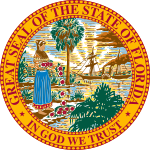| ||||||||||||||||||||
| ||||||||||||||||||||
 County results
Askew: 50–60% 60–70% 70–80% 80–90% Kirk: 50–60% 60–70% | ||||||||||||||||||||
| ||||||||||||||||||||
| Elections in Florida |
|---|
 |
|
|
The 1970 Florida gubernatorial election took place on November 3, 1970, to determine the governor and lieutenant governor of Florida, concurrent with the election to the United States Senate, elections to the United States House of Representatives, and various state and local elections.
Incumbent Republican governor Claude R. Kirk Jr. chose to run for a second term, with this being the first election in which the incumbent would be eligible for another four-year term. The first Republican elected governor since the Reconstruction Era, Kirk was challenged by Eckerd Corporation founder Jack Eckerd and State Senator Louis A. "Skip" Bafalis for his party's nomination. After failing to receive a majority, Kirk prevailed over Eckerd in a runoff. The primary for the Democratic Party nomination featured a four candidate field, with Florida Attorney General Earl Faircloth and President pro tempore of the Florida Senate Reubin Askew advancing to a runoff. Askew won the runoff and received the nomination of the Democratic Party.
This was the first election since the re-establishment of the office of lieutenant governor. Askew selected Florida Secretary of State Thomas Burton Adams Jr., while Kirk chose to run with incumbent Ray C. Osborne. Primarily due to controversial statements and actions during his term, as well as his inability to portray Askew as an extreme liberal as he had done with Robert King High in 1966, Kirk lost re-election to Askew in the general election by a margin of 56.88% to 43.12%.

